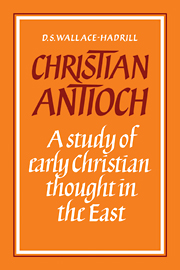Book contents
- Frontmatter
- Contents
- Foreword
- Abbreviations
- Introduction: survey of the history of Antioch
- 1 The religious background to Antiochene Christianity: pagan, Jewish, gnostic
- 2 The interpretation of the biblical record
- 3 Historiography in the Eastern Church
- 4 The doctrine of the nature of God
- 5 The use of Greek philosophy by the Eastern Church
- 6 The human experience of Christ and the salvation of man
- 7 Antiochene theology and the religious life
- Appendix 1 Eastern representation at Nicaea
- Appendix 2 The feminine element in Syrian Christianity
- Notes
- Bibliography
- Index
5 - The use of Greek philosophy by the Eastern Church
Published online by Cambridge University Press: 03 May 2010
- Frontmatter
- Contents
- Foreword
- Abbreviations
- Introduction: survey of the history of Antioch
- 1 The religious background to Antiochene Christianity: pagan, Jewish, gnostic
- 2 The interpretation of the biblical record
- 3 Historiography in the Eastern Church
- 4 The doctrine of the nature of God
- 5 The use of Greek philosophy by the Eastern Church
- 6 The human experience of Christ and the salvation of man
- 7 Antiochene theology and the religious life
- Appendix 1 Eastern representation at Nicaea
- Appendix 2 The feminine element in Syrian Christianity
- Notes
- Bibliography
- Index
Summary
It is only in a general sense that the Christian writers of Antioch can be called Aristotelian. The sense in which the term is admissible is that which credits them with an Aristotelian frame of mind or outlook, and this is probably true of many of them even when they had little knowledge of Aristotle's work and joined the chorus of patristic condemnation of many of his philosophical tenets. Aristotle's concentration of mind upon observable facts finds some analogy in the Antiochene emphasis upon historical events and upon the humanity of Christ, but this much hardly allows us to see Aristotle as a direct influence upon their thinking. In so far as they refer to him, it is usually to demonstrate his errors, and like all Christians of a philosophical turn of mind during the first four centuries after Christ, they find Plato more congenial. It was the Syriac-speaking Church to the east of Antioch which, in the centuries after Antioch itself had ceased to be important as an intellectual centre, adopted Aristotelian logical method wholeheartedly for reasons which are not in all respects clear and which are certainly complex, and then elevated a serviceable logical tool into a closed system such as Aristotle himself might well have repudiated. It was the Syrian Church that transmitted the entire Aristotelian corpus to the Arab world, and so played an important rôle in saving Aristotle for the west. But in this Antioch itself played no part. Indeed it can be said that Alexandria, that nursery of Platonists, contributed demonstrably more to the study of Aristotle than was ever true of Antioch.
- Type
- Chapter
- Information
- Christian AntiochA Study of Early Christian Thought in the East, pp. 96 - 116Publisher: Cambridge University PressPrint publication year: 1982

